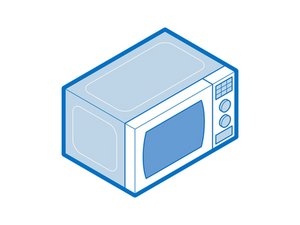Hi @diyaddict ,
There is usually only one fuse in a microwave oven. If it was faulty, nothing would work.
A circuit breaker operating indicates that the current flowing through it has exceeded its’ rating.
Have you proved that the problem is only when using the microwave, you didn’t say?
Does the circuit breaker also trip when using another appliance with the same or greater power consumption as the microwave when plugged into the same wall outlet?
Check the information labels on the appliances to check the power consumption figures e.g. microwave might say 1200W input and an electric kettle might say 2000W so try the kettle. If the breaker also trips when using the kettle, perhaps the problem is the breaker or the breaker circuit and not the microwave
If this occurs only with the microwave and then when the microwave is cooking then there is a problem in the operating circuit of either the turntable motor, internal fan or the magnetron circuit as these components are in use when cooking and you have checked that all the other circuits that can be in operation without the microwave actually cooking don’t cause the problem to occur.
An example could be there is a low resistance connection between a wire carrying supply voltage in the microwave when it is cooking and the frame of the microwave which is earthed (wire rubbing on frame perhaps) and therefore this trips the breaker. This is a safety feature, preventing electrocution if someone touches the metal case of the oven.
In any event there are several possible causes and the microwave would have to be opened and tested as to the cause of the problem. In electrical circuits and electronic circuits is doesn’t have to be the same fault every time that can give the same symptoms
Working on microwave ovens is extremely dangerous if you don’t know what you’re doing. There is still potentially lethal voltage (>6000V) in the microwave circuit even when it has been disconnected from the power for some time. If you don’t know what you’re doing then don’t do it! It’s not worth it, leave it to the experts.
crwdns2934105:0crwdne2934105:0
crwdns2934113:0crwdne2934113:0
crwdns2915270:0crwdne2915270:0
crwdns2889612:0crwdne2889612:0
6

 4
4  4
4 
 2
2 



crwdns2944067:033crwdne2944067:0
Yes! So annoying! About 6 months ago it started tripping if we would open the door before the microwave beeped. It actually blew our circuit that the microwave is on and we had to replace two outlets. Now it happens the second we turn the microwave on. I think we’re just going to replace-I’m sick of dealing with it and don’t want to risk a fire. Terrible microwave for sure!
crwdns2934271:0crwdnd2934271:0 Christine Riedel crwdne2934271:0
We also purchase our microwave in 2018 (February to be exact)
crwdns2934271:0crwdnd2934271:0 Christine Riedel crwdne2934271:0
@Christine Riedel ,
You should always pause or turn off the microwave using the microwave's control panel before opening the door, as a high current is flowing through the door interlock switches when the microwave is operating.
The door interlock switches are a safety feature designed to prevent the microwave from operating and emitting harmful radiation if a door is open and should not be used as a bypass for the correct way to operate the microwave .
You now know what results in doing it the wrong way
crwdns2934271:0crwdnd2934271:0 jayeff crwdne2934271:0
@jayeff Yes, of course. Now if you can teach my husband and kids, that would be great. Seems that there’s an issue with this microwave regardless though.
crwdns2934271:0crwdnd2934271:0 Christine Riedel crwdne2934271:0
@Christine Riedel ,
What is the make and model number of the microwave?
If it is tripping the breaker now as soon as is turned on there there most probably is faulty component or perhaps a wire that is touching the chassis that is causing this to happen.
You could try opening the microwave to inspect it for "flash" burn marks on the case or stressed components (burnt looking etc) to see if anything is obvious.
Be aware that microwaves are dangerous to work on even when unplugged as they can store >6000V in the HV capacitor for months unless it is discharged correctly before proceeding with any repairs. This amount of voltage can be lethal depending on your medical condition or it is still capable of giving a nasty shock.
Don't know about your husband but maybe advising the kids that they'll be paying for it if they damage it might slow them down a bit. Worked on me a long, long time ago. As a kid, it used to take me weeks to pay for things out of my pocket money/part time before school job for what I damaged. ;-)
crwdns2934271:0crwdnd2934271:0 jayeff crwdne2934271:0
crwdns2934275:028crwdne2934275:0